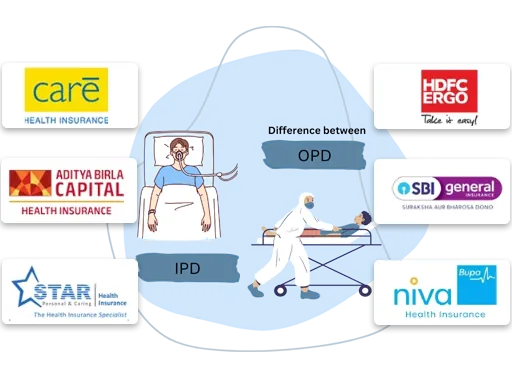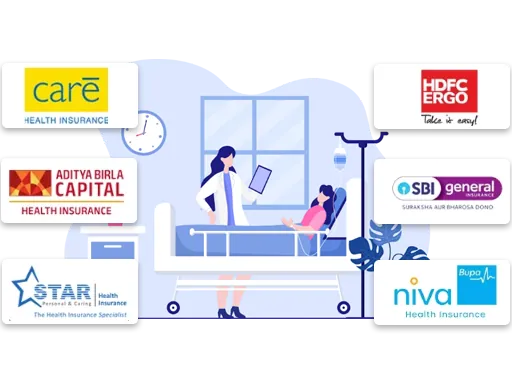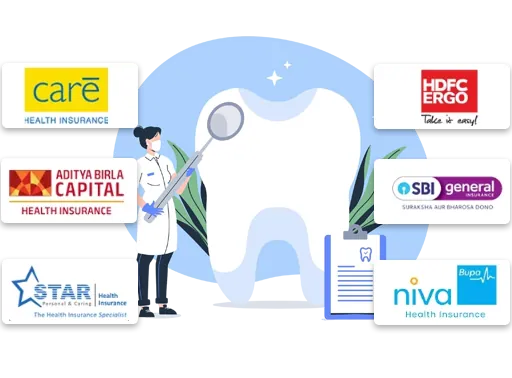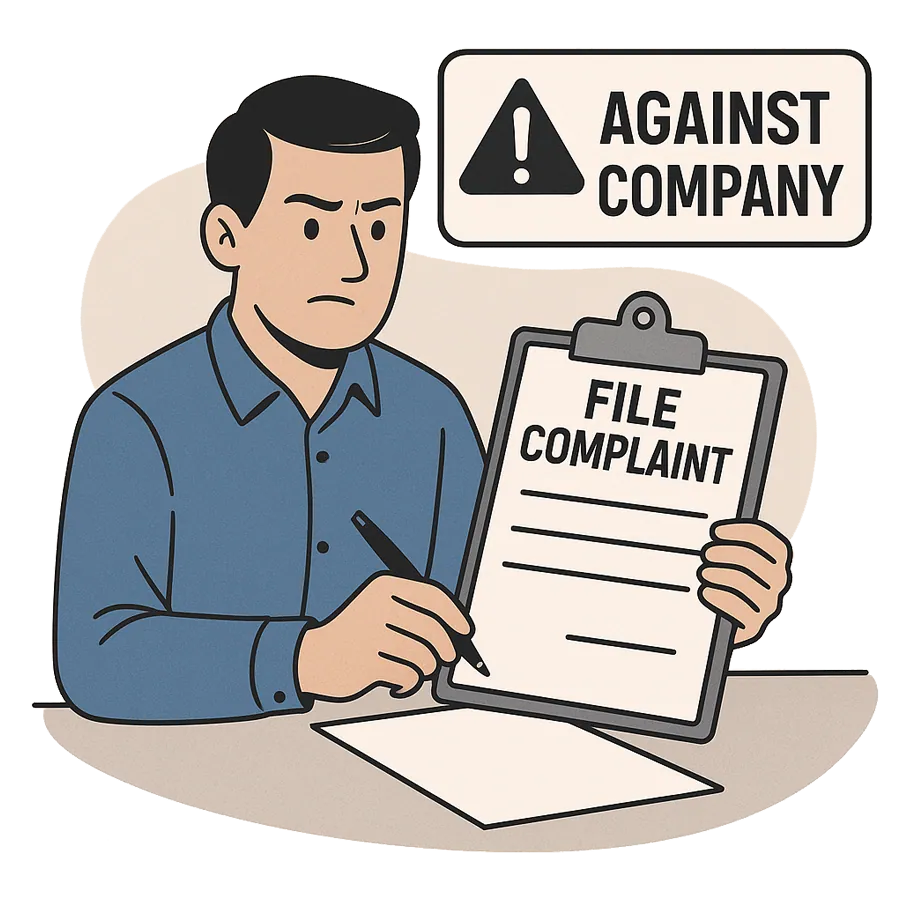OPD and IPD Treatment




Simran is an insurance expert with more than 4 years of experience in the industry. An expert with previous experience in BFSI, Ed-tech, and insurance, she proactively helps her readers stay on par with all the latest Insurance industry developments.
Reviewed By:

Anchita has over 6 years of experience in content marketing, insurance, and healthcare sectors. Her motto to make health and term insurance simple for our readers has proven to make insurance lingos simple and easy to understand by our readers.
Updated on Jul 07, 2025 4 min read
Difference between OPD and IPD Treatment
OPD (Out-patient Department) and IPD (In-patient Department) have different meanings and scopes of coverage. In this article, we explore both OPD and IPD treatments and the claim processes.
What is OPD (Outpatient Department) ?
OPD (Outpatient Department) refers to all the healthcare services you can avail of without getting admitted to a hospital. Diagnostics, doctor’s consultations, and follow-up appointments fall under OPD care. You must remember that OPD care is not limited to hospitals, but can be availed in clinics, diagnostic centres, and virtually.
What is IPD (Inpatient Department) ?
The Inpatient Department, or IPD, refers to the comprehensive medical services provided to an individual admitted to the hospital for more than 24 hours.
Key Differences Between OPD and IPD
| Parameters | OPD | IPD |
| Definition | Medical treatments where the patient is not admitted to the hospital for 24 hours. | Medical treatments are offered to patients who need to stay in the hospital for a longer period. |
| Services Provided | Doctor consultations, diagnostic tests, and minor procedures. | ICU care, surgery, comprehensive treatments, and 24/7 supervision for patients. |
| Coverage | Lower coverage limit as compared to IPD. | Wider medical costs are covered. |
| Type Of Treatment | Planned, usually non-emergency and precautionary check-ups or diagnostics. | Emergency care, accident hospitalization, organ donation, and more. |
| Hospital Bed Requirement | Not required | You will require a hospital bed for treatment. |
Do I Need An Appointment For OPD Care?
No, OPD care is flexible and can be availed for unexpected health concerns without an appointment. Your health insurance policy covers you for doctor’s consultations, diagnostics, and other OPD facilities. You can access medical care without prior appointments, helping you cater to medical emergencies.
However, there are certain key points you must keep in mind:
Wait Time
When seeking OPD treatments, you must be prepared for potential wait time, as patients with prior appointments will be prioritized.
Accessible Walk-ins
OPD treatments and services are accessible as walk-ins for urgent needs.
Access OPD Care Online
Post-COVID, OPD care was revolutionized, with blood test samples collected from home, doctor online consultations, and more making OPD efficient. However, check whether your health plan covers the same.
Emergency Hospitalization
Visit emergency care for health emergencies instead of OPD care.
What Does OPD Care Cover?
Some common coverage terms and conditions under OPD care are:
- Doctor’s consultation fee
- Diagnostic tests like blood samples, X-rays, ultrasounds, etc.
- Pharmacy bill for prescription medicines
- Dental care and eye check-ups
- Medical procedures like wound dressings, etc.
 traordinary Facts
traordinary Facts
Recently, the National Health Authority achieved 4 Crore OPD registrations through ABHA-based scan and share service. Most of these registrations came from Uttar Pradesh, Andhra Pradesh, Karnataka, and Jammu & Kashmir.
What Does IPD Cover?
Some common coverage terms and conditions under IPD are:
- Hospitalization cover
- Room rent
- ICU cover
- Medical treatments and procedures
- Pre and post-hospitalization, etc.
How To Claim For OPD and IPD Medical Care?
Specific steps are involved in the claim process of OPD and IPD medical care.
OPD Claims
Step 1 - You need to pay upfront at the time of availing OPD care like diagnostic tests, doctor consultations, etc.
Step 2 - Collect all your bills, reports, and other relevant documents related to your OPD care.
Step 3 - Submit your claim form along with collected documents to your insurer for OPD claim reimbursement.
Step 4 - Once your insurer verifies your documents, your claim amount is reimbursed based on your health policy terms and conditions.
IPD Claims
IPD claims can be processed as cashless and reimbursement claims, let us look at each one separately.
| Cashless Claims
| Reimbursement Claims |
| Intimate your health insurance company regarding IPD treatment. | Initially, the patient pays the hospital bill out of their pocket to the hospital. |
| Fill in the pre-authorization form and send it to the insurer. | Fill out the pre-authorization form and send it to your insurer. |
| Provide all the documents like discharge summaries, diagnostic reports, and more. | Attach all the necessary documents with the form. |
| Your insurer will verify your details with the hospital | Your insurer will verify your details along with your treatment history. |
| Your hospital bill is settled directly with the hospital without spending out of pocket. | Once approved, the amount will be reimbursed to your bank account as per policy terms and conditions. |
OPD Vs. IPD: Opting for The Right Treatment
If you are wondering when to select OPD or IPD treatments, here is your answer:
Go for OPD treatments if,
- You want a routine check-up
- Minor procedures (daycare) that do not require hospitalization, for example dialysis
- Diagnostic tests
- Pharmacy requirements
- Preventive health care services such as annual health check-ups
Go for IPD treatments if,
- You require hospitalization for 24 hours or more
- Emergency cases like accidents, heart attacks, etc.
- Maternity, and newborn care
- ICU care
- Critical illness surgeries, or operations
OPD and IPD: Two Pillars of Health Insurance
Both OPD and IPD play important roles in securing your health. They are both important pillars of the healthcare system in India serving different purposes.
While OPD caters to minor healthcare needs like daily check-ups, diagnostic tests, and others. IPD caters to the serious health conditions requiring hospitalization for more than 24 hours. Understanding the difference between both is crucial before purchasing a health insurance plan in India.
If you are seeking expert guidance regarding the best OPD and IPD health plans in India, schedule a personalized call with our insurance experts today!
Consult for Personalized Insurance Advice

But how does it work?
Schedule a call with India’s number 1 trusted advisor with a 4.5+ rating on Google. We are not your average insurance agents. Our advisors are experts in their insurance knowledge and will give you the right information at the right time. The service is free of cost! Don’t worry, we won’t spam as we value your time.
Health Insurer Network Hospitals
Difference Between OPD and IPD Treatment: FAQs
1. What is the difference between OPD and IPD?
OPD and IPD cater to different medical care needs. OPD focuses on minor treatments and routine check-ups, while IPD focuses on severe medical care needs that require more than 24 hours of hospitalization.
2. What kind of services are offered in OPD care?
OPD care provides diagnostics, doctor consultations, preventive check-ups, pharmacy needs, etc.
3. What kind of services are offered in IPD care?
ICU coverage, operation cost, emergency care, critical illness hospitalization, etc.
4. Can a patient visit OPD without a prior appointment?
Yes, you can visit OPD departments without prior appointments.
5. Is dental covered in OPD care?
Most health insurance plans in India cover dental and vision care treatments under OPD. However, you must read the terms and conditions.
Health Insurance Companies
Know More About Health Insurance Companies
Share your Valuable Feedback
4.4
Rated by 2635 customers
Was the Information Helpful?
Select Your Rating
We would like to hear from you
Let us know about your experience or any feedback that might help us serve you better in future.


Written By: Simran Kaur Vij
Simran is an insurance expert with more than 4 years of experience in the industry. An expert with previous experience in BFSI, Ed-tech, and insurance, she proactively helps her readers stay on par with all the latest Insurance industry developments.




















Do you have any thoughts you’d like to share?